be _of_ 结构与介词宾语从句
be of 结构与介词宾语从句
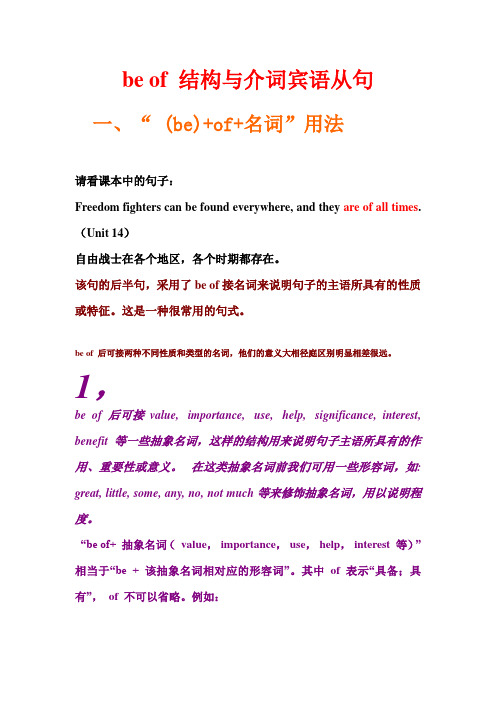
be of 结构与介词宾语从句一、“ (be)+of+名词”用法请看课本中的句子:Freedom fighters can be found everywhere, and they are of all times.(Unit 14)自由战士在各个地区,各个时期都存在。
该句的后半句,采用了be of接名词来说明句子的主语所具有的性质或特征。
这是一种很常用的句式。
be of 后可接两种不同性质和类型的名词,他们的意义大相径庭区别明显相差很远。
1,be of 后可接value, importance, use, help, significance, interest, benefit 等一些抽象名词,这样的结构用来说明句子主语所具有的作用、重要性或意义。
在这类抽象名词前我们可用一些形容词,如: great, little, some, any, no, not much等来修饰抽象名词,用以说明程度。
“be of+ 抽象名词(value,importance,use,help,interest 等)”相当于“be + 该抽象名词相对应的形容词”。
其中of 表示“具备;具有”,of 不可以省略。
例如:They are of great help to learners of English.他们对英语学习者来说是很有帮助的。
The press conference seems of great importance.这个新闻发布会看来很重要。
I don't want to hear what you are saying. It is of no interest to me. 我不想听你说,我对此不感兴趣。
(of no interest=not interesting)Doing morning exercises will be of benefit to your health.做早操对你的健康有利。
宾语从句种类有3类
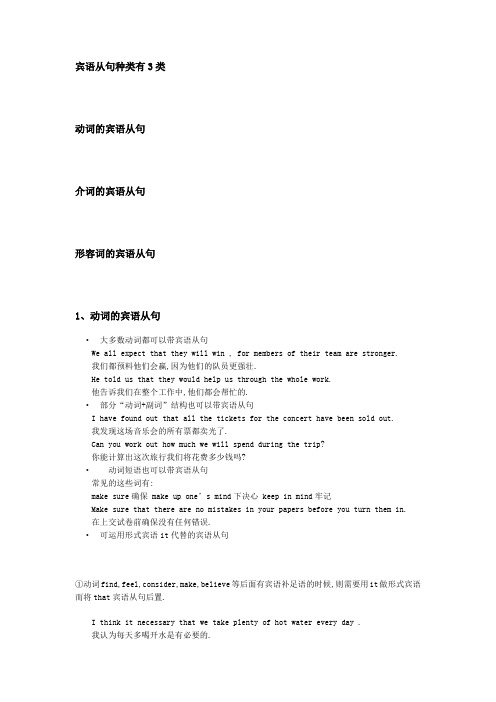
宾语从句种类有3类动词的宾语从句介词的宾语从句形容词的宾语从句1、动词的宾语从句·大多数动词都可以带宾语从句We all expect that they will win , for members of their team are stronger.我们都预料他们会赢,因为他们的队员更强壮.He told us that they would help us through the whole work.他告诉我们在整个工作中,他们都会帮忙的.·部分“动词+副词”结构也可以带宾语从句I have found out that all the tickets for the concert have been sold out.我发现这场音乐会的所有票都卖光了.Can you work out how much we will spend during the trip?你能计算出这次旅行我们将花费多少钱吗?·动词短语也可以带宾语从句常见的这些词有:make sure确保 make up one’s mind下决心 keep in mind牢记Make sure that there are no mistakes in your papers before you turn them in.在上交试卷前确保没有任何错误.·可运用形式宾语it代替的宾语从句①动词find,feel,consider,make,believe等后面有宾语补足语的时候,则需要用it做形式宾语而将that宾语从句后置.I think it necessary that we take plenty of hot water every day .我认为每天多喝开水是有必要的.I feel it a pity that I haven’t been to the get-together.我没去聚会,感觉非常遗憾.②有些动词带宾语从句时需要在宾语与从句前加it这类动词主要有:hate, take , owe, have, see to.I hate it when they with their mouths full of food.我讨厌他们满嘴食物时说话.He will have it that our plan is really practical.他会认为我们的计划确实可行.We take it that you will agree with us.我们认为你会同意我们的.When you start the engine, you must see to it that car is in neutral.开启发动机时, 一定要使汽车的离合器处于空挡位置.③若宾语从句是wh-类,则不可用it代替We all consider what you said to be unbelievable.我们都认为你所说的是不可信的.We discovered what we had learned to be valuable.我们发现我们所学到的东西都是有用的.2、介词的宾语从句·用wh-类的介词宾语从句We are talking about whether we admit students into our club.我们正在讨论是否让学生加入我们的俱乐部.The new book is about how Shenzhou 6 manned spaceship was sent up into space.这本新书是关于神州6号载人航天飞船是如何升入太空的.·用that,if引导的介词宾语从句有时候except,but,besides三个介词后可见到that引导的宾语从句I know nothing about my new neighbor except that he used to work with a company.对于我的新邻居我只知道他曾在一家公司上班,其他一无所知.3、形容词的宾语从句·常用来引导宾语从句的形容词有:sure,certain,glad,please,happy,sorry,afraid,satisfied,surprisedI am sure I will pass the exam.我确信我会通过考试.I am sorry that I have troubled you so long.很抱歉我这么长时间在打扰你.He is glad that Li Ming went to see him when he was ill.他很高兴在他生病的时候李明能去看望他.注意A 宾语从句必须用陈述语序。
高中英语宾语从句详解

高中英语宾语从句详解1、概述用作宾语的从句叫做宾语从句.宾语从句的位置与陈说句基本结构中的宾语相反.宾语从句可作谓语动词的宾语, 也可以作介词和非谓语动词〔动词不定式、动名词、分词〕和某些描画词的宾语.宾语从句可以由附属连词that whether if, 关系代词what,who,whose,which和关系副词when、where、how、why等引导.He said he wanted to go to town.他说他想去城里.I hope you'll be better soon.我希望你能很快好起来.I’m so glad that you were able to come to this party.你能设法抽空列席这个交际会, 我很快乐.I know nothing about it except what I have read in the papers.除了在报上读到的以外,我对这件事一无所知.Most of the Chinese people usually go to work on the bike except when it rains.除了雨天,大少数中国人普通都骑自行车下班.He asked me whether she was coming.他问我, 她来还是不来.2、作动词宾语〔1〕由附属连词that引导的宾语从句.that引导宾语从句时, 只起引导词作用, 在句中不做成分, 在口语和非正式文体中常省去.I think(that)he'll be right in a few days.我以为他几天后就会好的.I wish(that)she would understand me.我希望她了解我.〔2〕由关系代词what,who,whose,which引导的宾语从句, 在句中作成分, 即主语、宾语、表语和定语, 关系代词在句中不能省略.A computer can only do what you have instructed it to do.计算机只能按人的指令去做.Do you know whom they are waiting for?你知道他们在等谁吗?He asked whose dictionary it was.他问这是谁的字典.He can't tell which method they will use for the experiment.他不能判定他们会用哪一种方法做实验.〔3〕关系副词when, where, how, why等引导宾语从句.关系副词when, where, how, why既有疑问意义, 又起衔接作用, 而且在宾语从句中充任各种状语, 区分表时间、地点、方式、缘由.在句中不能省略.Please tell me when we shall discuss our plan.请通知我我们将何时讨论方案.I don't know where we are going to have the meeting.我不知道我们将在哪里休会.Will you tell me how I can get to the station?你能通知我如何能到车站吗?Do you know why he said that?你知道他为什么说那件事吗?I remember when this used to be a quiet village.我记得这里曾经是一个僻静的村庄.〔4〕由附属连词whether或if引导的宾语从句.I wonder whether(if)daughters are valued as much as sons in the countryside.我想知道在乡村女儿能否和儿子一样遭到注重.I don't know whether(if)you are willing to help me.我不知道你能否情愿帮我.留意:whether和if的区别.〔5〕动词+直接宾语+宾语从句.动词如:advise,ask,inform,promise,question,remind,show,teach,tell,warn等, 宾语从句前可以有一个直接宾语, 这个宾语有时可以省略, 有的不能省略.He has informed me when they are to discuss my proposal.他曾经通知我们将什么时分讨论我的建议.(me不可省略)She promised(us)that she would give us more help later on.她容许以后给我们更多的协助.(us可省略)3、作介词宾语It depends on whether he is coming or not.这要看他能否会来.I was curious as to what we could do next.我想知道下一步我们该做什么.留意:that引导的宾语从句只在in,but,except,besides等少数介词后作宾语, 构成固定搭配, in that在于〔由于〕, but that要不是(只是), except that除了…….The higher income tax is harmful in that it may discourage people from trying to earn more.所得税过高是有害的, 由于它能够使人不愿多赚钱.His paper is perfect except that there were some misprints.除了一些印刷错误之外, 这篇论文很好.4、作描画词宾语.No one can be sure what man will look like in a million years.谁也不知道一百万年先人类会变成什么样子.I am not certain whether I have met him before.我不能一定从前能否见过他.I'm sorry(that)you're ill.你病了, 我很忧伤.留意:that引导的从句在以下描画词前面作宾语, that可以省略anxious,aware,certain,confident,convinced,determined,glad,proud,surprised,worried,sorry, thankful,ashamed,disappointed,annoyed,pleased,hurt,satisfied,content,proud等.I'm sure(that)he'll help you.我确信他会协助你.I'm glad(that)he has passed the exam.我很快乐, 他考试及格了.5、it充任方式宾语, 真正的宾语---宾语从句后置.正如我们常用it充任方式主语替代主语从句一样, 我们也常用it用作方式宾语替代宾语从句,把真正的宾语从句后置.特别是带复合宾语的句子中.在这种结构中that不可省略.有以下几种状况:〔1〕believe,consider,declare,estimate,fancy,feel,find,guess,hear,imagine,know,make, prove,reckon,think,understand等动词接复合宾语〔宾语+宾补〕时, 要用it作方式宾语. We find it difficult that we should finish the work on time.我发现我们按时完成任务有困难. She thinks it wrong that he didn't answer the phone.她以为他不接是不对的.〔2〕在like, enjoy, love,hate,take等表喜怒哀乐的动词, 后假定要跟宾语从句, 需跟方式宾语it.I hate it when people talk with their mouths full.我不喜欢人们满口饭说话.I like it that everyone passed the exam.都经过了考试我很喜欢.〔3〕由动词和介词构成的短语动词后接that宾语从句时, 要用方式宾语.We are thinking of it that we'll lend you some money.我正在思索借给你钱的事.I shall see to it that he is taken good care of when you are absent.你不在的时分我担任把他照顾好.〔4〕用于〝动词+宾语+介词短语〞的句型中.Keep it in mind that you have to be home by ten o’clock.要记住你得十点钟之前回家.We took it for granted that he would come.我们以为他来是当然的.6、不可直接跟that从句的动词.以下动词不可直接接that从句:ask,refuse,let,like,cause,force,condemn,admire,celebrate,entreat,dislike,overlook,love,hel p,take,forgive,bid,hate,hear〔听见〕,see〔看见〕,want〔想要〕等, 但可用it,the fact做媒介, 后接that从句;或接动名词、不定式.He overlooked it that he had made another mistake.(对)他无视了一件事, 他又犯了一个错误. He overlooked the fact that he had made another mistake.(对)He overlooked that he had made another mistake.(错)I admire it that they won the match.(对)I admire the fact that they won the match.(对)我很羡慕, 他们赢得了竞赛.I admire that they won the match.(错)7、that引导宾语从句的省略.〔1〕主句谓语动词是agree,argue,hold,learn,maintain,observe,contend,conceive,reckon, remark,state,suggest,assume,announce,calculate,indicate等时, 其后宾语从句的引导词that普通不可省略;主句谓语动词是hear,know,say,see,confess consider, declare,understand,propose等时, 其后宾语从句的引导词that可以省略, 也可以不省略;主句谓语动词是think,suppose,believe,presume,dare say等时, 其后宾语从句的引导词that可以省略.He suggested that we should set off at8o’clock tomorrow morning.他建议我们明天早晨8点走.(that不可省略)I think(that)this is very important.我以为这很重要.(that可省略)〔2〕当一个句子很复杂, 句中有多个状语时, that不可省略;或许一个句子有多个并列的宾语从句时, 特别第一个宾语从句特别长, 前面的宾语从句的that不可省略;谓语动词与that 从句之间有拔出语时, that不可省去.He said you needn't worry and that he would help you.他说你没有必要着急, 他会协助你的.〔said之后可省去that, 但第二个that不可省去〕We decide,as he has suggested,that we will start out tomorrow.就像他建议的那样, 我们决议明天动身.8、否认转移与省略〔1〕假设主句的谓语动词是〝think,consider,suppose,believe,expect,fancy,guess,reckon, imagine等, 主语是第一人称的普通如今时态, 其后的宾语从句如含有否认意义, 一定要把否认词一道主句谓语上, 从句谓语动词用一定方式.I don’t think he can do it better than me.我想他不会比我干得好.I don’t believe he treated the child like that.我置信他不会那样看待孩子的.〔2〕假设think,consider,suppose,believe,expect,fancy,guess,reckon,imagine等前有副词或表示强调的do,does,did;或许同其它词构成并列谓语;或许不以如今时出现;或许用作拔出语中.这时分不用否认转移.I really expect she didn’t say that to him.我确实希望她和睦他说那件事.I think and hope that he won’t be deceived by the man.我以为也希望他不会被那团体诈骗.〔3〕think,consider,suppose,believe,expect,fancy,guess,reckon,imagine等此类动词后, 在复杂答语中, 用so替代前文一定的宾语从句;假定替代一个否认的宾语从句, 用not或not…so替代前文整个从句.-I believe we've met somewhere before.我以为我们从前在哪见过.-No, I don't think so.没有, 我以为我们以前没见过.-Do you think it's going to rain over the weekend?你以为这周末会下雨吗?-I believe not.我以为不会.留意:hope只能说I hope not一种方式, 由于hope不能否认转移.9、时态的照应与语序.在宾语从句中只能用陈说句语序, 时态照应上要遵照以下三条原那么:〔1〕假设主句谓语是普通如今时或未来时, 宾语从句的谓语可依据意思的需求运用任何一种时态.Can you make sure where Alice has put the gold ring?你能确定爱丽丝把金戒指放到什么中央了吗?They have no idea at all where he has gone.他们一点也不知道他去了哪.Do you know who he was talking with at eight last night?你知道他昨晚和谁一同说话吗?〔2〕假设主句谓语是普经过去时, 宾语从句要用表示过去的某一时态.He said he would come to see us the next day.他说他明天未来看我们.I wanted to know whether he had been to Beijing.我想知道他能否去过北京.〔3〕假设宾语从句是表示客观理想、真理等, 不论主句是什么时态, 宾语从句一概用普通如今时.Dick asked Lucy how old she is.迪克问露斯她多大了.The teacher said the sun rises in the east.教员说太阳从西方升起.要点一、宾语从句要点之时态的照应1. 假设主句是普通如今时、普通未来时或祈使句时,宾语从句可依据状况运用各种时态.例如:I hear she is here today(she was here yesterday/she will be here tomorrow.)2. 假设主句是普经过去时,宾语从句应运用过去时态的某种方式.例如:He said he was watching TV(he had swept thefloor/ he would play football after school).3. 如宾语从句所表达的是客观理想、自然现象或迷信真理等,从句不受主句时态限制,仍用普通如今时.例如:Our teacher told us that light travels fasterthan sound.二、宾语从句要点之引导词的运用1. 当宾语从句由陈说句变化而来时,用that来引导从句,that常无详细意义,普通可省略.例: Lin Tao thought (that)the TV play was veryboring.2. 当宾语从句是由普通疑问句变化而来时,要用if或whether来引导从句.例如:David asked his mother if/ whether she liked thedinner last night.3. 当宾语从句是由特殊疑问句变化而来时,原句中的疑问词充任衔接代词(如who, whose, what, which)或衔接副词(如when,where, why, how),引导宾语从句.例如:Do you know what we can do on the island?I don’t know why Jane was late for school this morning.三、宾语从句要点之语序的陈说化宾语从句普通要用陈说句语序.例如:When did he leave? I want to know. →I want to know when he left.Does the shop close at six every day? Do you know? →Do you know if/ whether the shop closes at six every day?四、宾语从句要点之否认转移当主句的谓语动词为think, believe, suppose等动词,且主语为第一人称时,从句的否认要转移到主句上.例如:I don’t believe he is here on time, is he?I don’t think Tom is the best student in his class, is he?。
高中英语六种基本句型结构

英语学习中的六种基本句型结构英语的句式从表达形式上来看,形式多样且丰富多彩,但仔细观察后就不难发现,无论其怎样变化,它们大都基本保持了常见的六个句型结构。
也就是说,绝大多数英语句子都是由这六个基本句式演变、衍生而成的。
因此,掌握好这六个基本句型以及他们的基本用法,对于初学英语的同学们来说,就显得非常重要了。
这里做一简单列举与说明,希望对同学们的学习有所帮助:英语五种基本句型列式如下:一:SV(主+谓)主语——动词二:SVP(主+系+表)主语——动词——表语三:SVO(主+谓+宾)主语——动词——宾语四:SVoO(主+谓+间宾+直宾)主语——动词——宾语——宾语五:SVOC(主+谓+宾+宾补)主语——动词——宾语——补语六: There be + 主语 + 其它一、句型 1:Subject (主语 ) + Verb (谓语 )这种句型中的动词大多是不及物动词,常见的动词如: work ,sing,swim,fish,jump,arrive,come, die, disappear,cry,happen等。
如:1)Li Ming works very hard 。
李明学习很努力。
2)The little girl cried even harder。
小女孩哭得更厉害了。
3)The accident happened yesterday afternoon。
事故是昨天下午发生的。
1、The sun is rising。
2、 I'll try 。
3、Did you sleep well?(well 做状语,修饰不及物动词sleep)4、The engine broke down。
注意:在此句型中,有少数不及物动词表达被动含义,表达主语本身所具有的特性,不用被动语态。
1、The book sells well。
2、The window won't shut。
3、The pen writes smoothly。
宾语从句考点归纳

宾语从句考点归纳宾语从句考点归纳宾语从句是高考的一个热点,又是一个难点,近几年虽说出现的次数不多,但是不能掉以轻心。
下面就高考试题谈一下宾语从句的考点和后不接that 从句的特殊情况。
一) 宾语从句可分为三类:1. 由that 引导,常跟在say, see, hear, doubt, think, know, believe, suggest等动词后2. 由if 或whether引导,常跟在wonder 和say等动词后3. 由等连接代词或连接副词引导。
近年来高考主要侧重对连接词的正确选择和从句中应使用陈述语序以及从句中时态呼应的考查。
(1) 连接代词均在宾语从句中充当主语、宾语、或定语;连接副词均充当状语。
因此应正确分析题意,断定宾语从句中缺少何种成分,然后再做出选择。
1.A computer can only do __you have instructed it to do (NMET2001)A. howB. afterC. whatD. when答案:C 连接代词,在宾语从句中充当宾语。
(2) 宾语从句应同主句在谓语时态上保持一致。
主句谓语是现在时,宾语从句的谓语可以是任意时态;主句谓语是过去时,宾语从句的谓语必须是过去的某种时态,(宾语是客观真理时则无此限制)如:The reporter said that the UFO ___ east to west when he saw it. (NMET2000) A. was travelling B.travelled C.had been traveling D.was to travel答案:A 从题意可知宾语从句的动作应是当时正在发生。
(3) 有时为使句子简洁明快还可以借助动词不定式来简化宾语从句,使用连接代(副)词+to do结构, 如:I’ve worked with children before, so I know what ____in my new job. (NMET2000)A. expectedB. to expectC. to be expectingD. expects (B)(4)宾语从句应使用陈述语序,尤其要注意由who, which, what, when, where, why, ho w等引导的宾语从句。
英语宾语从句

英语宾语从句宾语从句(OBJECT CLAUSE)是名词性从句的一种。
在主从复合句中充当宾语,位于及物动词、介词或复合谓语之后的从句称为宾语从句。
宾语从句分为三类:动词的宾语从句,介词的宾语从句和形容词的宾语从句。
动词+宾语从句例如:Mum doesn't know if/whether he will go to Paris withher.妈妈不知道他是否要参加运动会。
注意:动词词组后面也可跟宾语从句。
例如:makesure确保makeup one's mind下决心keepin mind牢记2.介词+宾语从句例如:He is thinking about what he should bring with him.他正在考虑随身携带什么。
3.形容词+宾语从句例如:Mother is happy that he will go there with her.妈妈很高兴他愿意一起去那里。
这样的形容词有:sure,certain,glad,please,happy,sorry,afraid,satisfied,s urprised等。
基本构成宾语从句的三要素是:语序、连接词和时态。
语序:宾语从句用陈述语序(主谓语序)例如:I wonder when the train will come.我想知道火车什么时候到。
连接词有三种情况:1.that宾语从句为陈述句时,连接词常选择that,有时将that省略。
例如:Mothersays(that)she is ill.妈妈说她病了。
Mothersays(that)she'll be alright in couple of days.妈妈说她过两天就好了。
2.if或whether宾语从句由一般疑问句变来时,连接词常选择if或whether。
只用whether的情况:介词的宾语,whether…or not结构中不能用if替换。
例如:Motherdoesn't know if he can help her.妈妈不知道他是否能帮助她。
宾语从句用法详解

宾语从句用法详解一.宾语从句的定义置于动词、介词等词性后面起宾语作用的从句叫宾语从句。
宾语从句的语序必须是陈述语序。
谓语动词、介词、动词不定式,v.-in g形式后面都能带宾语从句。
有些形容词(afraid,sure,glad等)之后也可以带宾语从句。
二.宾语从句中引导词的用法在复合句中作主句的宾语,引导词有:连词:that(that 常可省略),whether, if代词:who, whose, what,which副词:when ,where, how, why等。
(一)that引导的宾语从句(在非正式场合that可以省略)可跟that从句做宾语的动词有:say, think, insist, wish, hope, demand, imagin e, wonder, know, suppose, see, believe, agree, ad mit, deny, expect, explain, order,command, feel, dream, suggest, hear, mean, notice, prefer, req uest, require, propose, declare, report等。
例句:The boy believes that he will travel throughspaceto other planets.注意事项:当主句谓语动词是 think, believe, suppose, expect 等词,而宾语从句的意思是否定时,常把否定转移至主句表示。
例句:I don’t think it is right for him to treat you like that.在以下情况中that不能省略1.当句中的动词后接多于两个由that引导的宾语从句时,第一个that可省,但后面的that不可省。
ﻫ例句:He said(that) youwere too young to understandthe matter and that he was asked notto tell you.2.当主句的谓语动词与that宾语从句之间有插入语时,that一般不可省。
什么是宾语从句
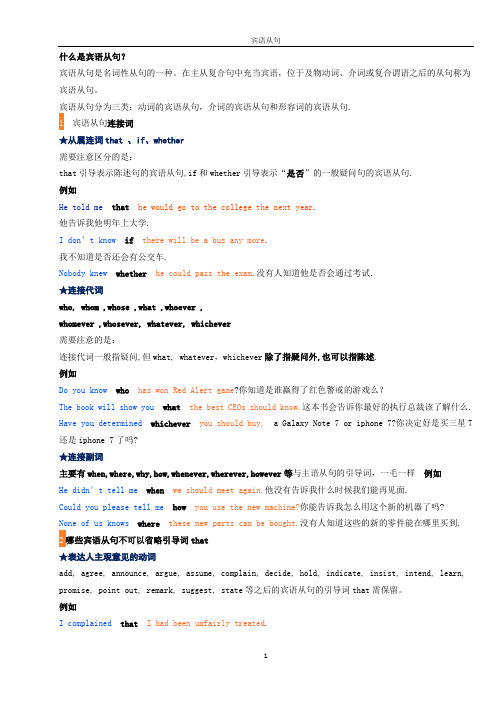
什么是宾语从句?宾语从句是名词性从句的一种。
在主从复合句中充当宾语,位于及物动词、介词或复合谓语之后的从句称为宾语从句。
宾语从句分为三类:动词的宾语从句,介词的宾语从句和形容词的宾语从句.1宾语从句连接词★从属连词that 、if、whether需要注意区分的是:that引导表示陈述句的宾语从句,if和whether引导表示“是否”的一般疑问句的宾语从句.例如He told me that he would go to the college the next year.他告诉我他明年上大学.I don’t know if there will be a bus any more.我不知道是否还会有公交车.Nobody knew whether he could pass the exam.没有人知道他是否会通过考试.★连接代词who, whom ,whose ,what ,whoever ,whomever ,whosever, whatever, whichever需要注意的是:连接代词一般指疑问,但what, whatever,whichever除了指疑问外,也可以指陈述.例如Do you know who has won Red Alert game?你知道是谁赢得了红色警戒的游戏么?The book will show you what the best CEOs should know.这本书会告诉你最好的执行总裁该了解什么. Have you determined whichever you should buy, a Galaxy Note 7 or iphone 7?你决定好是买三星7还是iphone 7了吗?★连接副词主要有when,where,why,how,whenever,wherever,however等与主语从句的引导词,一毛一样例如He didn’t tell me when we should meet again.他没有告诉我什么时候我们能再见面.Could you please tell me how you use the new machine?你能告诉我怎么用这个新的机器了吗?None of us knows where these new parts can be bought.没有人知道这些的新的零件能在哪里买到.2哪些宾语从句不可以省略引导词that★表达人主观意见的动词add, agree, announce, argue, assume, complain, decide, hold, indicate, insist, intend, learn, promise, point out, remark, suggest, state等之后的宾语从句的引导词that需保留。
be aware of 句子成分

be aware of 句子成分"Be aware of" 是一个英语短语,意思是“意识到”、“注意到”、“明白了解”。
在句子中作为谓语动词时,通常后面跟着宾语或宾语从句,表示提醒或告诫对方注意某件事情。
例如:- Be aware of the risks before investing in the stock market. (投资股市前要注意风险。
)- We should be aware of the importance of protecting the environment.(我们应该意识到环境保护的重要性。
)在句子中作为形容词或副词时,通常修饰名词或形容词,表示警觉或提醒。
例如:- Be aware of your surroundings when walking alone at night.(晚上独自行走要留意周围环境。
)- She is aware of the potential problems and is taking steps to prevent them.(她意识到潜在的问题并正在采取措施加以预防。
)在句子中作为介词短语时,后面通常跟着名词或动名词形式作宾语,表示关注某个事物或人。
例如:- You need to be aware of the changes in the market.(你需要关注市场的变化。
)- He is aware of his own limitations and always tries to improve himself.(他清楚自己的限制,并且总是努力提高自己。
)总之,“be aware of”在句子中可以作为谓语动词、形容词或副词、介词短语等不同的语法成分,但它本身的意思都是“注意到”、“意识到”。
(完整版)宾语从句种类有3类

宾语从句种类有3类动词的宾语从句介词的宾语从句形容词的宾语从句1、动词的宾语从句·大多数动词都可以带宾语从句We all expect that they will win , for members of their team are stronger.我们都预料他们会赢,因为他们的队员更强壮.He told us that they would help us through the whole work.他告诉我们在整个工作中,他们都会帮忙的.·部分“动词+副词”结构也可以带宾语从句I have found out that all the tickets for the concert have been sold out.我发现这场音乐会的所有票都卖光了.Can you work out how much we will spend during the trip?你能计算出这次旅行我们将花费多少钱吗?·动词短语也可以带宾语从句常见的这些词有:make sure确保 make up one’s mind下决心 keep in mind牢记Make sure that there are no mistakes in your papers before you turn them in.在上交试卷前确保没有任何错误.·可运用形式宾语it代替的宾语从句①动词find,feel,consider,make,believe等后面有宾语补足语的时候,则需要用it做形式宾语而将that宾语从句后置.I think it necessary that we take plenty of hot water every day .我认为每天多喝开水是有必要的.I feel it a pity that I haven’t been to the get-together.我没去聚会,感觉非常遗憾.②有些动词带宾语从句时需要在宾语与从句前加it这类动词主要有:hate, take , owe, have, see to.I hate it when they with their mouths full of food.我讨厌他们满嘴食物时说话.He will have it that our plan is really practical.他会认为我们的计划确实可行.We take it that you will agree with us.我们认为你会同意我们的.When you start the engine, you must see to it that car is in neutral.开启发动机时, 一定要使汽车的离合器处于空挡位置.③若宾语从句是wh-类,则不可用it代替We all consider what you said to be unbelievable.我们都认为你所说的是不可信的.We discovered what we had learned to be valuable.我们发现我们所学到的东西都是有用的.2、介词的宾语从句·用wh-类的介词宾语从句We are talking about whether we admit students into our club.我们正在讨论是否让学生加入我们的俱乐部.The new book is about how Shenzhou 6 manned spaceship was sent up into space.这本新书是关于神州6号载人航天飞船是如何升入太空的.·用that,if引导的介词宾语从句有时候except,but,besides三个介词后可见到that引导的宾语从句I know nothing about my new neighbor except that he used to work with a company.对于我的新邻居我只知道他曾在一家公司上班,其他一无所知.3、形容词的宾语从句·常用来引导宾语从句的形容词有:sure,certain,glad,please,happy,sorry,afraid,satisfied,surprisedI am sure I will pass the exam.我确信我会通过考试.I am sorry that I have troubled you so long.很抱歉我这么长时间在打扰你.He is glad that Li Ming went to see him when he was ill.他很高兴在他生病的时候李明能去看望他.注意A 宾语从句必须用陈述语序。
be形容词of结构
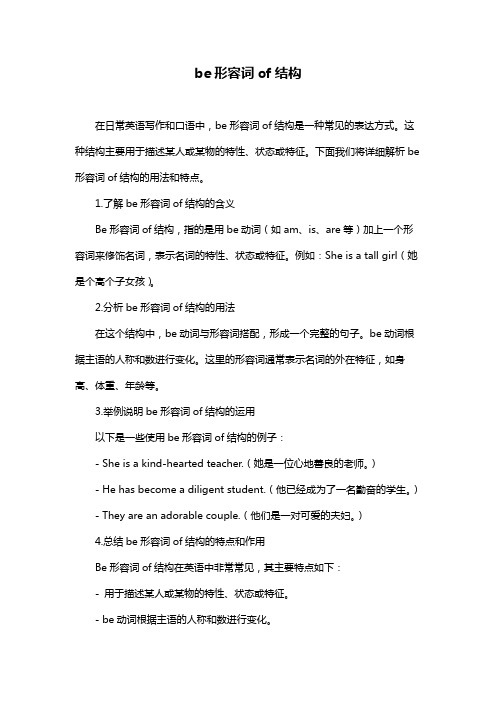
be形容词of结构在日常英语写作和口语中,be形容词of结构是一种常见的表达方式。
这种结构主要用于描述某人或某物的特性、状态或特征。
下面我们将详细解析be 形容词of结构的用法和特点。
1.了解be形容词of结构的含义Be形容词of结构,指的是用be动词(如am、is、are等)加上一个形容词来修饰名词,表示名词的特性、状态或特征。
例如:She is a tall girl(她是个高个子女孩)。
2.分析be形容词of结构的用法在这个结构中,be动词与形容词搭配,形成一个完整的句子。
be动词根据主语的人称和数进行变化。
这里的形容词通常表示名词的外在特征,如身高、体重、年龄等。
3.举例说明be形容词of结构的运用以下是一些使用be形容词of结构的例子:- She is a kind-hearted teacher.(她是一位心地善良的老师。
)- He has become a diligent student.(他已经成为了一名勤奋的学生。
)- They are an adorable couple.(他们是一对可爱的夫妇。
)4.总结be形容词of结构的特点和作用Be形容词of结构在英语中非常常见,其主要特点如下:- 用于描述某人或某物的特性、状态或特征。
- be动词根据主语的人称和数进行变化。
- 形容词通常表示名词的外在特征。
通过使用be形容词of结构,我们可以更直观、清晰地描述人物或事物的特点,使句子更具有表现力和生动性。
总之,be形容词of结构是英语中一种重要的表达方式,掌握其用法和特点,有助于我们更好地描述人物或事物的特性、状态和特征。
40第三章 动词、介词和形容词的宾语从句

第三章 | 动词、介词和形容词的宾语从句今天这篇文章是要教大家顿悟动词的宾语从句。
上一讲我们为同学们讲解了宾语从句的引导词、时态、语序和其他相关考点,今天我们将为大家梳理宾语从句的三种结构形式,即动词的宾语从句、介词的宾语从句和表动作意义的形容词的宾语从句。
语法名词:动词的宾语从句、介词的宾语从句、形容词的宾语从句、宾语从句的引导词(that, what/whatever, when, where, why, which, whether, who, how)核心讲解:我们先来看几个例子:1.我想知道这种做法是否说得通。
I wonder whether we have passed the exam.谓语引导词宾语从句这个句子的宾语从句是“whether we have passed the exam”,whether在从句中不担任成分,译为“是否”。
这个从句在动词“wonder”之后,这就是动词的宾语从句。
2.我正在思考你说的话。
I am thinking about what you said.谓语介词宾语从句这个句子的宾语从句是“what you said”,what在从句中充当宾语,译为“什么(话)”。
这个从句在介词“about”之后,这就是介词的宾语从句。
3.大众应该明白每个人都有可能成为污染的受害者。
The public should be aware that everyone could be a victim of pollution.谓语形容词引导词宾语从句这个句子的形式比较特殊,句子的谓语是系表结构“should be aware”,正常来讲,形容词做表语后面并不能接宾语,也就是名词或句子。
但这里的形容词“aware”实际上表达的是动词含义“意识到”,所以我们很多时候将“形容词+从句”的结构理解为形容词的宾语从句,即认为形容词之后的从句为句子的宾语。
所以这个句子的宾语为“that everyone could be a victim of pollution”,这是一个完整的句子,由that引导,that在从句中不充当成分,也无意义。
定语从句与宾语从句的区别与联系

宾语从句一、宾语从句概说宾语从句是在复合句中起宾语作用的从句。
在谓语动词,介词和某些形容词等后面都可以接宾语从句。
同学们要掌握好宾语从句,主要应该注意以下三个关键:1.连接词:根据从句类型而定。
2.语序:用陈述句语序。
3.时态:根据主句中谓语动词的时态而定。
〔自然、科学规律及真理可以除外〕二、宾语从句的连接词:1.thatthat引导陈述意义的宾语从句,无实际意思,在从句中也不充当任何成分。
在口语和非正式文体中that常被省略。
She said that she missed us very much.她说她非常想念我们。
I think she is right.我认为她是对的〔that被省略〕2.whether, if:whether与if引导选择意义的宾语从句,意思为"是否"。
I wonder whether/ if she still lives here after so many years.这不知道经过这么之年她是否还住在这里。
Have you found out whether/if he is in London?你弄清楚他是否在伦敦了吗?3.what, who, whom, which这是一组连接代词,引导疑问意义的宾语从句。
Can you tell me what bread is made from?你能告诉我面包是由什么制造的吗?I can't remember who has come to my office.我不记得谁来过我的办公室了。
Tom asked me whom/who they were talking about.汤姆问我他们在谈论谁。
I want to know which is better.我想知道哪一个更好些。
whom引导宾语从句时一般可由who替换,但如果宾语从句的介词提前,则只能用whom,不能用who。
I wonder with who she is angry.〔×〕I wonder with whom she is angry.我不知道她在跟谁生气。
各类从句讲解
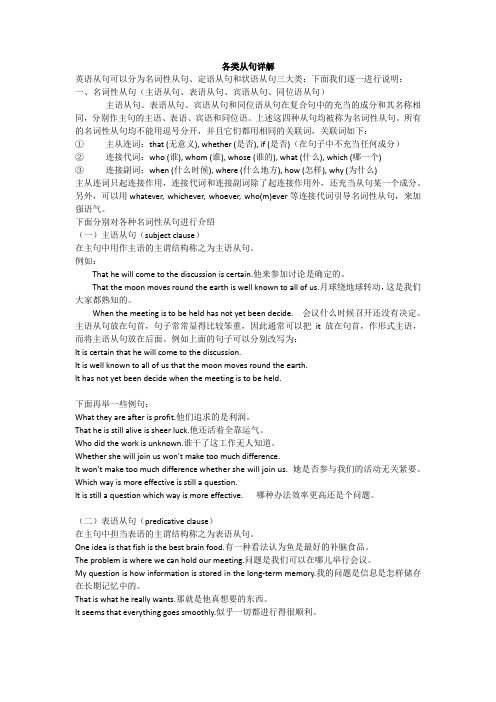
各类从句详解英语从句可以分为名词性从句、定语从句和状语从句三大类:下面我们逐一进行说明:一、名词性从句(主语从句、表语从句、宾语从句、同位语从句)主语从句、表语从句、宾语从句和同位语从句在复合句中的充当的成分和其名称相同,分别作主句的主语、表语、宾语和同位语。
上述这四种从句均被称为名词性从句。
所有的名词性从句均不能用逗号分开,并且它们都用相同的关联词,关联词如下:①主从连词:that (无意义), whether (是否), if (是否)(在句子中不充当任何成分)②连接代词:who (谁), whom (谁), whose (谁的), what (什么), which (哪一个)③连接副词:when (什么时候), where (什么地方), how (怎样), why (为什么)主从连词只起连接作用,连接代词和连接副词除了起连接作用外,还充当从句某一个成分。
另外,可以用whatever, whichever, whoever, who(m)ever等连接代词引导名词性从句,来加强语气。
下面分别对各种名词性从句进行介绍(一)主语从句(subject clause)在主句中用作主语的主谓结构称之为主语从句。
例如:That he will come to the discussion is certain.他来参加讨论是确定的。
That the moon moves round the earth is well known to all of us.月球绕地球转动,这是我们大家都熟知的。
When the meeting is to be held has not yet been decide. 会议什么时候召开还没有决定。
主语从句放在句首,句子常常显得比较笨重,因此通常可以把it放在句首,作形式主语,而将主语从句放在后面。
例如上面的句子可以分别改写为:It is certain that he will come to the discussion.It is well known to all of us that the moon moves round the earth.It has not yet been decide when the meeting is to be held.下面再举一些例句:What they are after is profit.他们追求的是利润。
高考英语介词的宾语从句精选试题解析版

高考英语介词的宾语从句精选试题解析版参考答案与试题解析1.The way he did it was different ____ we were used to.()A.in which B.in what C.from what D.from which 【分析】他做这件事的方式和我们过去习惯的(方式)不同.【解答】答案:C考查宾语从句.be different from…,意为"和…不同",be different in意为"在…方面不同",排除A、B项,且to是介词,用what作其宾语,what表示一个总体概念,它一般不用在有具体选择范围的句子中.排除D项(which则表示在一个具体的范围内进行选择.),只有C项正确.故选:C。
【点评】考查宾语从句,弄清楚哪些连词引导宾语从句及一些宾语从句的特殊结构,准确地翻译句子及备选答案,然后选择最符合题意的选项.2.In spite of _________ has been said,quite a lot of people are still uncertain about the state of the country's economy.()A.what B.which C.that D.as【分析】尽管已经被告知了一些事情,许多人仍然对国家的经济形势心存疑虑.【解答】答案:A.考查宾语从句.本句中,介词of之后跟宾语从句,从句中缺少主语,排除C、D两项.句意:尽管已经被告知了一些事情,许多人仍然对国家的经济形势心存疑虑.which意为哪一个,与句意不符.故选:A.【点评】宾语从句引导词的选择,首先要看从句中缺少什么成分,然后结合引导词本身的意义做出正确的选择.3.These computers are different from __________.()A.that we expectedB.which we have expectedC.what we expectedD.what we expect【分析】这些电脑和我们预期的不一样。
主系表后面的宾语从句

主系表后面的宾语从句主系表后面的宾语从句通常用来补充主语的信息,使句子更加完整和准确。
下面是一些常见的主系表后面的宾语从句列表,希望能对您有所帮助。
1. 引导动词的宾语从句:常见引导动词有:think(认为)、believe(相信)、know(知道)、guess(猜测)、understand(明白)等。
例如:- I think that he is a good person.(我认为他是个好人。
)- She believes that hard work always pays off.(她相信勤奋肯定会有回报。
)- I am not sure if I can make it to the meeting on time.(我不确定我能否准时参加会议。
)2. 引导连接词的宾语从句:常见的引导连接词有:that(那)、whether/if(是否)、when(当...的时候)、where(在哪里)、how(怎么)等。
例如:- He told me that he would come to see me tomorrow.(他告诉我说他明天会来看我。
)- I am not sure whether I should take this job or not.(我不确定我是否应该接受这份工作。
)- Could you please tell me where the nearest post office is?(你能告诉我最近的邮局在哪里吗?)3. 引导疑问词的宾语从句:常见的引导疑问词有:what(什么)、who(谁)、whom(谁)、whose(谁的)、which(哪一个)等。
例如:- I don't know what he wants to say.(我不知道他想说什么。
)- Do you know who invented the telephone?(你知道是谁发明了电话吗?)- I wonder which book she is reading now.(我不知道她正在读哪本书。
宾语从句格式
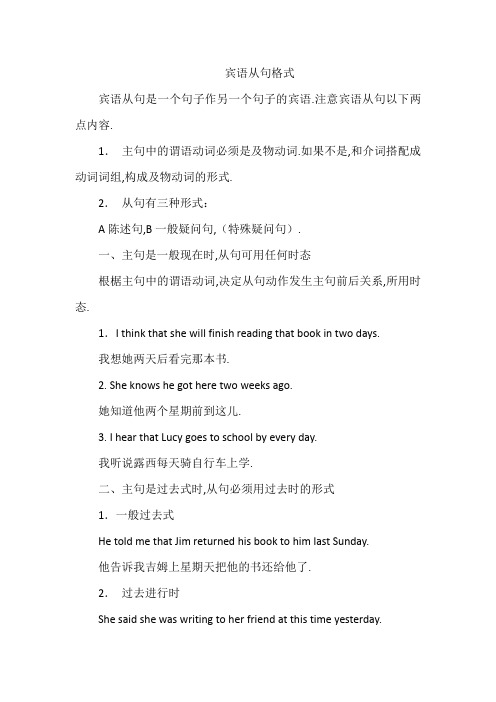
宾语从句格式宾语从句是一个句子作另一个句子的宾语.注意宾语从句以下两点内容.1.主句中的谓语动词必须是及物动词.如果不是,和介词搭配成动词词组,构成及物动词的形式.2.从句有三种形式:A陈述句,B一般疑问句,(特殊疑问句).一、主句是一般现在时,从句可用任何时态根椐主句中的谓语动词,决定从句动作发生主句前后关系,所用时态.1.I think that she will finish reading that book in two days.我想她两天后看完那本书.2. She knows he got here two weeks ago.她知道他两个星期前到这儿.3. I hear that Lucy goes to school by every day.我听说露西每天骑自行车上学.二、主句是过去式时,从句必须用过去时的形式1.一般过去式He told me that Jim returned his book to him last Sunday.他告诉我吉姆上星期天把他的书还给他了.2.过去进行时She said she was writing to her friend at this time yesterday.她说她昨天这时候正在给她的朋友写信.3.过去将来时He asked when they would leave the next week.他问他们下个星期什么时候出发.4.过去完成时She said she had known him since two years ago.她说她自从两年前就认识他.5.如从句是客观真理时,用一般现在时She told us the earth moves around the sun.她告诉我们地球围绕太阳转.The teacher said Japan is the east of China.老师讲日本位于中国的东部.三、宾语从句三种形式1.陈述句,前用引导词that,但经常省略(1)I hear (that) he will help you with your French.我听说他将帮忙你的法语.(2)Lily knew (that)Tom had gone to London by air.莉莉知道汤姆坐飞机去伦敦了.2.从句是一般疑问时,前用if或whether(1)He asked if she liked swimming.他问她是否喜欢游泳.(2)He asked me whether Mike came to school by bike or on foot.他问我迈克骑自行车还是步行去学校.(3)She asked whether Jim left the message or not when he left.她问当吉姆离开时是否留条没有.(4)The old woman depends on whether her daughter lives.那位老太太是否依靠她女儿生活.注:A.一般疑问句if和whether可以互换.B.引导从句时,问题不明确,并得到对方肯定答复.常or与or not 或连用.C.主句动词是由介词构成及物动词形式,后跟着从句时,用whether.3.从句是特殊疑问句A.特殊疑问词不是作主语,疑问词放在句首,其它部分按陈述句语序.B.如特殊疑问词作主语,语序不用动.1.She doesn’t know who he has borrowed a maths book from.她不知道他从谁那借了一本数学书.2.Do you know what he did with that thing?他知道他怎样处理那件事的吗?3.Could you tell me who can look after her?你能告诉我谁能照顾她吗?注:A.主句是一般疑问,句尾用问号、用升调.B.主句不是一般疑问句,句尾用句号,用降调.四、“在be形容词glad, sorry, sure, surprised等”后跟that引导的从句.意思上看起来是宾语从句,实际上引导的是原因状语从句,说明主句的原因1.I’m glad that you come to see me.你来看我,我很高兴.2.I’m sorry that everything hasn’t gone very well.很抱歉一切事情进行很不顺利.3.I’m sure that he will mind you taking it away.我敢肯定你把它拿走他会介意的.五、一般疑问句主要有think, believe, suppose, don’t you know 这类词时.在句中主句的主谓结构是插入语,从句的疑问词是在主句前1.Who do you think is looking for you ?你认为谁正在找你呢?2.When don’t you know we’ll have meeting?你不知道我们什么时候开会吗?3.Whom do you believe she can come with?你相信她能和谁来呢?六、动词think, believe, suppose, expect等,否定时,到从句翻译,叫转意否定.1.I don’t think she can lend it to the others, can she?我想她不会把它借给其他人,是吗?2.I don’t believe everyone has done his homework, have they?我相信大家不没有做作业,是吗?注:转意否定时,反意疑问句看从句部分.七、宾衙从句与简单句形式1.从句与宾补形式(1)I heard she was singing in the next room just now.I heard her singing in the next room just now.刚才我听到她在隔房间唱歌.注:现在分词作宾补时,强调动作正在进行.(2)I saw he ran out with a football.I saw him run out with a football.我看到他拿一个足球跑了出去.注:A.动词不定式作宾补时,表示动作的过程.B.如有let, help, make, see, watch, hear, feel等词作谓语时,动词作宾补时省略to.2.从句和动词不定式短语动词不定式短语是由“疑问词+不定式”在句子中作宾语.(1)She knows how she can look up this word“use”她知道她怎样能查到“use”这个单词.She knows how to look up this word“use”她知道怎样能查到“use”这个单词.(2)Could you tell me what I should do for him?你能告诉我我应该为他做些什么吗?Could you tell me what to do for him?你能告诉我为他做些什么吗?3.从句与动名词从句的动词发生在主句的动作之前.在简单句中用动名词形式,因动名词表示发生过的动作.(1)I remembered I had returned the book to him.我记得我把书还他了.I remembered returning the book to him.我记得把书还给他了.(2)She forgot that she had lent her pen to me.她忘了她把她的钢笔借给我了.She forgot lending her pen to me.她忘了把她的钢笔借给我了.。
五大从句结构
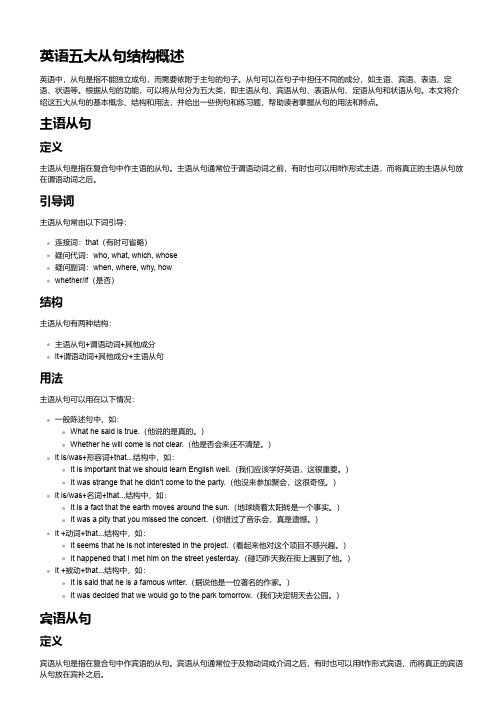
英语五大从句结构概述英语中,从句是指不能独立成句,而需要依附于主句的句子。
从句可以在句子中担任不同的成分,如主语、宾语、表语、定语、状语等。
根据从句的功能,可以将从句分为五大类,即主语从句、宾语从句、表语从句、定语从句和状语从句。
本文将介绍这五大从句的基本概念、结构和用法,并给出一些例句和练习题,帮助读者掌握从句的用法和特点。
主语从句定义主语从句是指在复合句中作主语的从句。
主语从句通常位于谓语动词之前,有时也可以用it作形式主语,而将真正的主语从句放在谓语动词之后。
引导词主语从句常由以下词引导:连接词:that(有时可省略)疑问代词:who, what, which, whose疑问副词:when, where, why, howwhether/if(是否)结构主语从句有两种结构:主语从句+谓语动词+其他成分it+谓语动词+其他成分+主语从句用法主语从句可以用在以下情况:一般陈述句中,如:What he said is true.(他说的是真的。
)Whether he will come is not clear.(他是否会来还不清楚。
)it is/was+形容词+that...结构中,如:It is important that we should learn English well.(我们应该学好英语,这很重要。
)It was strange that he didn't come to the party.(他没来参加聚会,这很奇怪。
)it is/was+名词+that...结构中,如:It is a fact that the earth moves around the sun.(地球绕着太阳转是一个事实。
)It was a pity that you missed the concert.(你错过了音乐会,真是遗憾。
)it +动词+that...结构中,如:It seems that he is not interested in the project.(看起来他对这个项目不感兴趣。
- 1、下载文档前请自行甄别文档内容的完整性,平台不提供额外的编辑、内容补充、找答案等附加服务。
- 2、"仅部分预览"的文档,不可在线预览部分如存在完整性等问题,可反馈申请退款(可完整预览的文档不适用该条件!)。
- 3、如文档侵犯您的权益,请联系客服反馈,我们会尽快为您处理(人工客服工作时间:9:00-18:30)。
be of 结构与介词宾语从句一、“ (be)+of+名词”用法请看课本中的句子:Freedom fighters can be found everywhere, and they are of all times.(Unit 14)自由战士在各个地区,各个时期都存在。
该句的后半句,采用了be of接名词来说明句子的主语所具有的性质或特征。
这是一种很常用的句式。
be of 后可接两种不同性质和类型的名词,他们的意义大相径庭区别明显相差很远。
1,be of 后可接value, importance, use, help, significance, interest, benefit 等一些抽象名词,这样的结构用来说明句子主语所具有的作用、重要性或意义。
在这类抽象名词前我们可用一些形容词,如: great, little, some, any, no, not much等来修饰抽象名词,用以说明程度。
“be of+ 抽象名词(value,importance,use,help,interest 等)”相当于“be + 该抽象名词相对应的形容词”。
其中of 表示“具备;具有”,of 不可以省略。
例如:They are of great help to learners of English.他们对英语学习者来说是很有帮助的。
The press conference seems of great importance.这个新闻发布会看来很重要。
I don't want to hear what you are saying. It is of no interest to me. 我不想听你说,我对此不感兴趣。
(of no interest=not interesting)Doing morning exercises will be of benefit to your health.做早操对你的健康有利。
Coal is of great importance to the development of industry.煤对工业发展是相当重要的。
(of great importance=very important)The book will be of great value to students of history.这本书对学历史的学生将很有用。
The meeting is of great importance.这个会议很重要。
This medicine is of no use.这种药无效。
This matter is of no significance.这件事无关紧要。
在“be of + 抽象名词”结构中,其意义就相当于“be + 与该抽象名词同词根的形容词”。
如:be of value→be valuable,be of help→be helpful,be of use→be useful, be of importance→be important,be of significance→be significant等。
它们之间可以相互转换,因此,以上各例句可转换为:They are very helpful to learners of English.This book is very valuable to students of history.This meeting is very important.This medicine is useless.This matter is insignificant.2. be of +名词,还可用来说明句子主语在度量,大小,颜色,类别等方面的特征。
这类名词有colour, age, size, height, weight, shape, type,kind等。
在这类名词前常用different,all, the same,this, that, a(n) + 形容词等词来修饰或说明。
“be of+ 表示年龄(age )、大小(size )、颜色(color )、重量(weight )、高度(height )、价格(price )、意见(opinion )、形状shape )种类kind )(、(和方法way )(等的名词” 表示,“具有……” ,说明主语的特征。
例如:When I was of your age,I entered the war.当我是你这个年龄的时候,我就去打仗了。
These flowers are of different colors.这些花的颜色都不同。
注意:在此结构中,如果后面的名词前有不定冠词 a / an ,则这个冠词相当于the same .例如:The two boys are of an age.The two boys are of the same age.这两个男孩同龄。
The two rooms are of a size .The two rooms are of the same size.这两个房间大小一样。
Coins may be of different sizes, weights, shapes, and of different metals.硬币可能在大小、重量、形状和铸造的金属方面都有所不同。
These pens are of many different colours.这些笔有许多不同的颜色。
He is of the same weight as his brother.他和他弟弟一样重。
注意:此类句型中的某些表达可以转换成“be + different +in + 抽象名词” 的形式。
“be + the same + in + 抽象名词” 的形式。
如:Coins may be different in size, weight, shape, and metal.These pens are different in colour.The two rooms are the same in size.The productive forces were of a very low level.生产力处于非常低的水平。
City Lights and Modern Times were of this kind.“城市之光”和“摩登时代”就是这种影片。
3、be of 还可以表示所属关系,相当于belong to .例如:China and India are of the third world. 中国与印度同属于第三世界。
Workers and peasants are of one family. 工人和农民是一家。
4、“be of + 物质名词”,表示主语是由某种材料制成或由某种成分构成,相当于be made of,be built of,be made up of 等。
例如:The necklace is (made)of glass. 这条项链是由玻璃制成的。
Our class is (made up)of over 50 students. 我们班有50 多个学生。
5、“be of + 形容词最高级=表示最,,之一”,相当于be one of .例如:His temper is of the quickest.他的脾气是最急躁的。
Mr Liu is of the best teachers in our school. 刘老师是我们学校最好的老师之一。
6、“be of+名词”也可以表示“来源、组成”。
如:He was of a poor peasant family. 他出身贫农家庭。
The committee is of seven people. 该委员会由7 人组成。
二、“ (be)+of+名词”结构的句法功能1.作表语:如:Their experience is of great significance.他们的经验是很意义的。
This problem is of different nature.这个问题是属于不同性质的。
Good intonation is of great importance.语调好很重要。
This dictionary is of great help.这本词典是很有帮助的。
Don't throw anything that may be of use.不要把任何有用的东西扔掉。
Flowers are of many colours.花的颜色很多。
New Zealand wine is of high quality and is sold all over the world.新西兰葡萄酒质量很高,行销全世界。
2. 作定语。
例如:Your sister is a girl of wisdom.你妹妹是一位有智慧的女孩。
(=Your sister is a wise girl.)We don't think there is anything of interest in your pictures. 我们认为你的画并没有什么有趣的地方。
3.作宾语补语:如:I consider what he said of little importance.我认为他所说的并没有什么重要性。
We all think his words of great importance.我们都认为他的话非常重要。
He found himself of absolutely contradictory pointsof view. 他发现自己处于完全矛盾的观点之中。
4.作状语:如:Man must,of necessity,die.人必然会有一死。
5、of+(one’s)own +V-ing结构这一结构表示某事由某人(亲自)完成。
其中be of后也可接物主代词加own或名词所有格加及物动词的V-ing主动形式。
如:The book is of my own choosing.这本书是我自己挑选的。
The cotton is of our growing.棉花是我们种的。
The house is of Tom’s repairing.这房子是汤姆修的。
The bridge is of the villagers’ own building.这座桥是村民们自己建的。
介词宾语从句We are talking about whether we admit students into our club.我们正在讨论是否让学生加入我们的俱乐部.The new book is about how the manned spaceship was sent up into space. 这本新书是关于载人航天飞船是如何升入太空的.The boy was interested in whatever he saw here.那孩子对在那里看到的任何事物都感兴趣。
